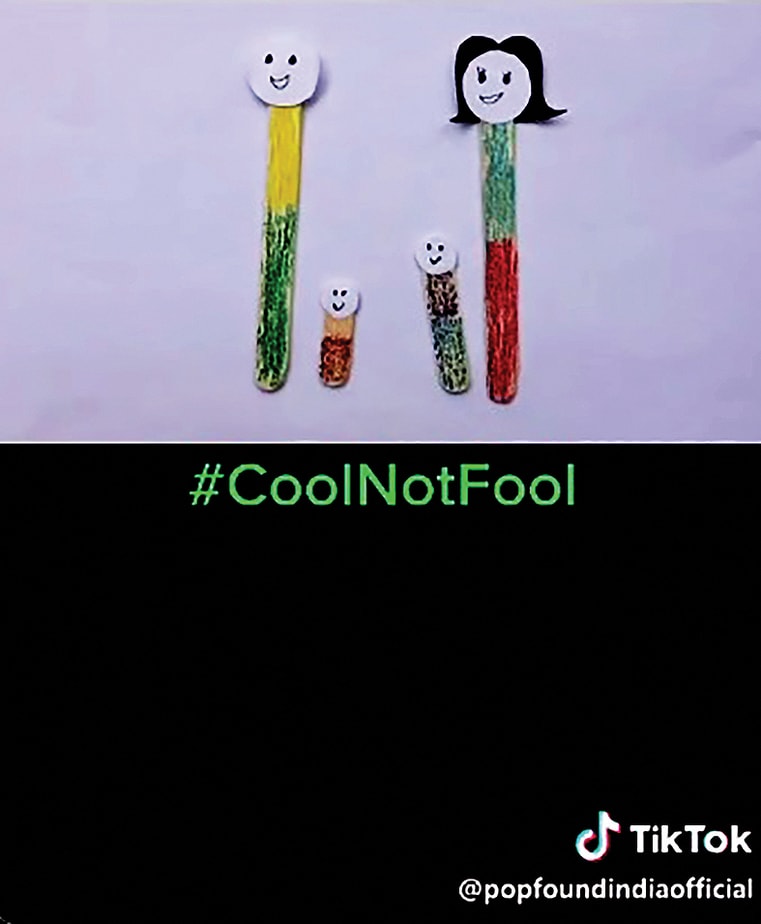A unique awareness campaign in social media ‘#CoolNotFool’ – with the aim to promote safe sexual practices and encourage conversations about family planning — has grabbed the attention of millennials
How often do children discuss sex with parents in India? Almost never. How often do people talk about safe sex and its importance out in the open? Seldom. To address such taboos surrounding sex, a unique awareness campaign in social media ‘#CoolNotFool’ has grabbed the attention of millennials in India.
The campaign collectively created by national NGO Population Foundation of India (PFI), TikTok India and Love Matters aims to promote safe sexual practices and encourage conversations about family planning. It is in the form of short video clips on TikTok and deals with themes such as family planning and safe sex.

TikTok is the leading destination for short-form mobile video. Based in China, it has centres in Angeles, New York, London, Paris, Berlin, Dubai, Mumbai, Singapore, Jakarta, Seoul and Tokyo. These videos, under #CoolNotFool have been a roaring success and crossed 85 million views. Apart from endorsing healthy family planning practices, the campaign aims to break the stigma associated with sexual health, especially among adolescents.
TikTok influencers are also uploading duets and reaction videos with the original campaign videos taking the message forward. Population Foundation of India’s page on TikTok has nearly five million video views and over 16,000 followers.
Speaking about the campaign, the Executive Director of Population Foundation of India (PFI) Poonam Muttreja says, “Young people need to have information about their sexual and reproductive health and rights as a pathway to responsible adulthood. Using platforms like TikTok which youth engage with, we hope to break the taboo around sexual and reproductive health while also creating awareness through entertaining content.”
“We consider family planning as a human right. Every woman and man has the right to take a decision on their families. PFI uses entertainment to shift behaviour and challenge social norms that consider conversations around sexual and reproductive health as taboo. We firmly believe that our digital platforms like TikTok will help us generate awareness, especially among the youth,” Muttreja adds.
Vithika Yadav, Head, Love Matters, India added, “In context of family planning and SRHR (sexual and reproductive health and rights), the idea that open, honest and engaging communication on sex, relationships and contraception using digital channels is gaining ground, not only in India but worldwide.”
Yadav also believes that male involvement along with female (both married and unmarried) is key to healthy relationships and improving family health. “The #CoolNotFool campaign is meant to engage with people in a fun, non-threatening, informative and engaging way to encourage communication on condoms, contraceptives and relationships. The idea is to redefine what is ‘cool’ and remove shame and stigma around talking about what’s safe and healthy when it comes to sex and relationships,” she explains.

“Internet penetration is growing at a rapid pace throughout the country, and online platforms like TikTok can prove to be the ideal vehicle of change to drive conversations around social issues. We are delighted to forge a collaboration with the Population Foundation of India and Love Matters to take the message of healthy family planning to our user base across India,” said Nitin Saluja, Director of Public Policy (India), TikTok.
The audience engagement has gone beyond views and likes – as evident from the comments the videos are attracting. Many viewers are asking for more information on contraceptives, especially their availability and side-effects. Most importantly, it has started a conversation on safe sexual practices among youngsters – which is not given much importance in our country, when it should be.
Netflix – the streaming giant – recently released its Top 10 most-viewed series on the platform (from October 2018 to September 2019). There, the series Sex Education has acquired the fifth position (with 40 million viewership). This series boldly explores sexual problems faced by adolescents – in a manner never done before.
It revolves around the life of a high school student — Otis Milburn – who is socially awkward and lives with his sex therapist mother, Jean. In Season 1, Otis and his friend Maeve Wiley set up a sex clinic at school to capitalise on his intuitive talent for sex advice. In Season 2, as a late bloomer, Otis must master his newly discovered sexual urges in order to progress with his girlfriend Ola whilst also dealing with his now strained relationship with Maeve. Meanwhile, Moordale Secondary is in the throes of a chlamydia outbreak, highlighting the need for better sex education at the school. New kids come to town who challenge the status quo.
The series is written and created by Laurie Nunn and produced by Eleven. Season 2 is directed by Ben Taylor, Alice Seabright and Sophie Goodhart. Jamie Campbell, Laurie Nunn and Ben Taylor are also Executive Producers on the series.
Sex Education will return to Netflix with eight brand new episodes in January 2020.





